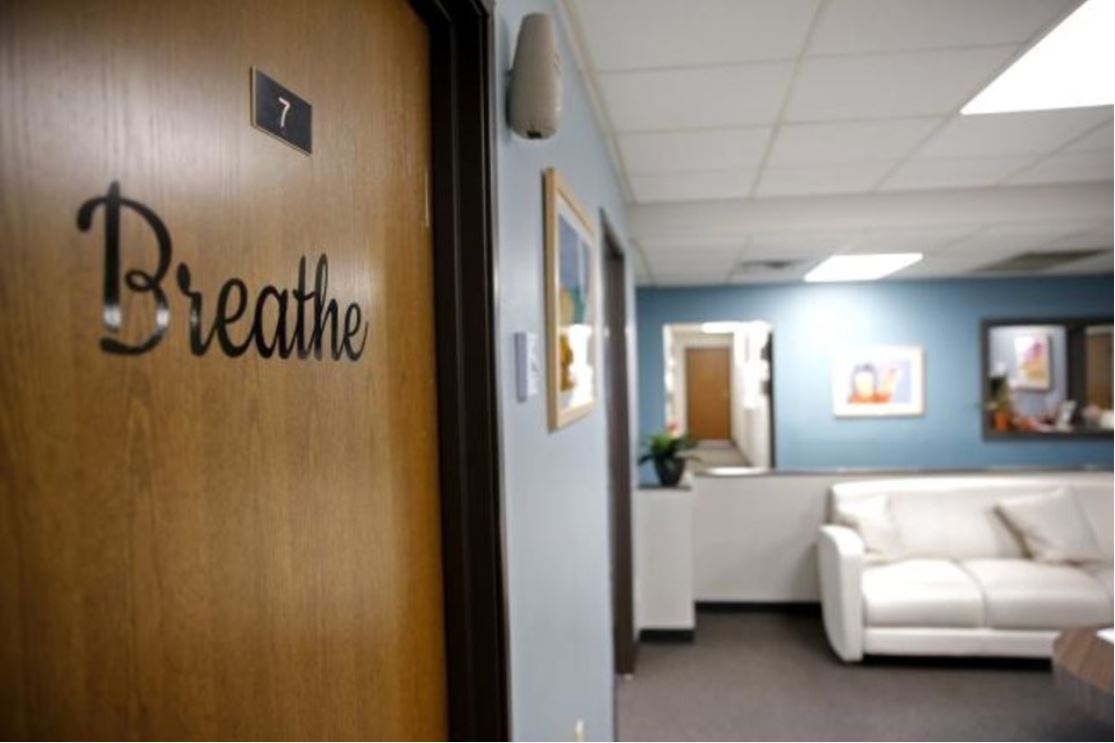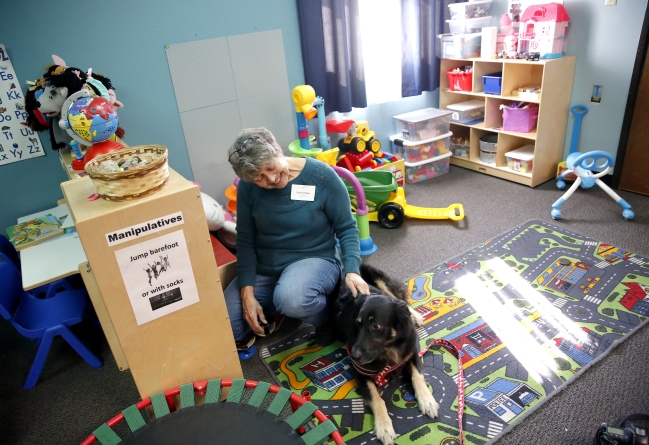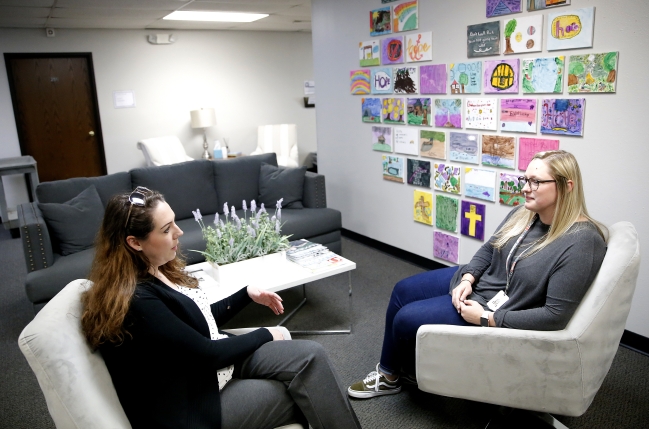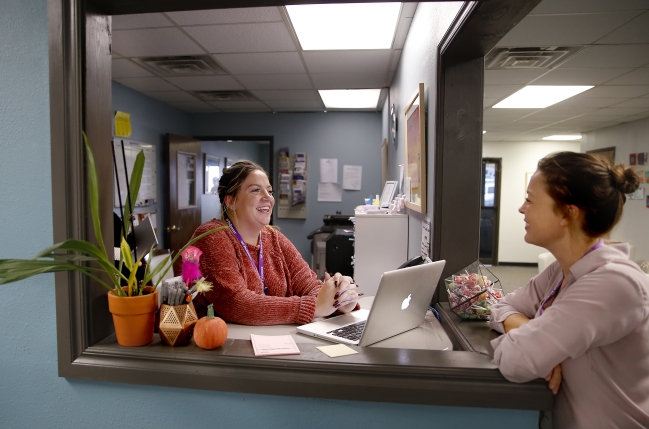The Oklahoman: MAPS 4 would fund new, permanent home for Palomar, OKC's Family Justice Center
By Darla Slipke
Published: November 24, 2019

Click here to read the story!
Jessica was terrified walking into the courthouse to file for a protective order. After she broke up with her boyfriend, he had showed up at her apartment, pushed his way inside and tried to strangle her.
The next day, she went to the courthouse where a worker handed her a clipboard. She sat, vulnerable, alone and in shock, as she filled out paperwork. No one explained the process to her or what to expect.
Five years later, her ex-boyfriend found out where she lived and showed up again. Jessica again sought a protective order. This time, she had the help of Palomar, Oklahoma City’s family justice center. This time, her experience was much different.
The center, which opened in 2017, brings a variety of agencies together under one roof to help victims of domestic violence, sexual assault, human trafficking and elder abuse, and children who have been exposed to trauma. It has been looked to as a model for other communities.
Partner agencies say collaborative efforts are making a difference. But despite best efforts, there are still needs in the community that are not being met.
MAPS 4 would provide $38 million to build a new, permanent home for the family justice center, which would help ensure Palomar’s work continues and thrives.
Palomar’s current facility is temporary. The new proposed building would allow Palomar to expand services, welcome more partner agencies and meet survivors’ holistic and long-term needs.
Jessica, who is identified only by her first name for personal safety reasons, immediately felt a sense of security when she arrived at Palomar.
A worker checked to make sure no one had followed her there. She was escorted to a private room with a soothing sound machine and tissues. There, a victim advocate listened to her story, helped her fill out paperwork for a protective order and filed it for her so she didn’t have to go to the courthouse.
Afterward, a police detective met with her. He stayed in touch with her throughout the court process.
Staff at Palomar advised Jessica about her options and her rights. They helped her find an attorney who had experience working with victims, and an employee from Palomar worked with the attorney throughout the case.
“I was able to walk away from the situation feeling like I had more support and resources that time around, and then they’ve just continued to be so great in terms of victim support,” she said.

“It was pretty shocking to realize the need that was out there.”
Kim Garrett CEO of Palomar
One in six homes
Last year, more than 32,000 domestic-related 911 calls were made in Oklahoma City. That number breaks down to about one in six households in the city.
But Kim Garrett, CEO of Palomar, said that’s a conservative number because many victims never call 911.
Palomar’s model of housing a variety of partner agencies under one roof allows for greater collaboration among service providers. By working more closely together, they’ve identified gaps and innovative ways to remedy them.
What in the past might have taken weeks of phone tag and trying to coordinate now takes mere minutes.
“You could literally just walk down the hall and say ‘I’ve got a really high-risk case, can you please help me?’” Garrett said. “And that’s what they’re doing right now. They will staff high-risk cases in live time, and that never happened before.”
Before Palomar, Garrett worked as victim services coordinator at the Oklahoma City Police Department. When families came in who were in crisis, she had an array of brochures to give them.
“We’d say go here for medical and go here for counseling and go here for your protection order,” she recalled.
She would call other agencies in town but often didn’t know the people working there because everyone was so busy with case work they didn’t have time to meet. They were working with the same families on the same cases, but they weren’t working together.
“Families were feeling the impact,” she said. “There are great, great agencies in our community, but when you’re not working together, it creates barriers. … And when you’re in trauma and when you’re afraid for your life, those little barriers can seem insurmountable.”
Before Palomar even opened, dozens of people came seeking services.
The building didn’t have phones or furniture or signs, but people showed up anyway. Garrett remembers Legal Aid attorneys sitting on the floor with clients, going through paperwork.
“It was pretty shocking to realize the need that was out there,” she said.

‘Big dreams’
The vision for the MAPS 4 project is to build a community healing and restoration center where more than 45 agencies can collaborate to support and empower survivors and their children. The center currently has 30 partner agencies.
The new building would provide secure space for people who are in acute crisis to receive wraparound services. It would be a safe, welcoming space where they can work through safety planning and coordinate immediate needs, including medical care, child care and housing, Garrett said.
The building also would include a community space for those who aren’t in immediate danger, but who would benefit from being around a community of survivors.
“This trauma cannot be resolved in a one-time crisis intervention model,” Garrett said. “This is deep. It actually changes your DNA, so you have to be able to provide long-term community to survivors.”
Garrett said they’d like to offer 24-hour assistance, a training center for conferences, educational seminars, speakers and meetings, trauma-informed childcare services, acute medical services, therapy and trauma treatment, among other services.
They’d like to have both a daycare facility and a drop-in for families who are in acute crisis who arrive feeling scared and unsettled, Garrett said. Once Palomar is able to help those families past the crisis and into safety and stability, the children could then go to the more structured daycare setting.
“Our clients have both needs,” Garrett said. “We need to meet them where they are.”
Other plans include incorporating a faith-based space for spiritual care and support. Palomar is looking to launch a chaplaincy program.
They’d also like to expand their animal advocacy program with the Humane Society. Often, pets have been abused, too.
By enhancing services and bringing in more partners, Garrett hopes they’ll be able to meet more diverse needs of clients.
“We have big dreams,” she said. “And what’s the message to survivors and their children? … The message is very clear: You matter, we’re not hiding anymore, and there’s hope. I think that’s really important.”
A business owner has committed to donating land in Midtown if MAPS passes, Garrett said.
She said they are looking at a variety of funding sources for operational costs, including donations and grants. They’re also exploring the idea of naming rights and developing a business to help generate revenue.
If MAPS 4 pays for a new building, Palomar would no longer have to pay rent, currently $12,600 a month, and could reallocate that money. If partner agencies moved full-time to the new building, they could also save money, she said.
Garrett has heard from some people who only want MAPS to fund infrastructure projects, but she said quality of life is not about bricks and mortar.
“It’s really powerful that our city council and mayor have a bold new vision for our community and are including social issues,” Garrett said. “I’m proud of their leadership.”

Interrupting the cycle
Jessica said domestic violence doesn’t discriminate.
“As we think about our city and what we’re trying to become, we’ve got to stop this,” she said. “It’s impacting children, it’s impacting women, it’s impacting everybody around us, and it’s prevalent in every single neighborhood. We’ve got to put an end to it if we want our future to be bright.”
Many people don’t understand why people stay in abusive relationships, she said. Palomar has helped to educate the community about the many challenges that can make it difficult for someone to leave an abusive relationship and to break down the stigma surrounding domestic violence.
“I think what a lot of people don’t realize is a lot of times the abuser makes a very compelling reason to stay,” she said. “They don’t start out being abusive. That happens over time, and so they create a really great environment and get you to a situation where it’s really difficult for you to leave.”
Jessica never thought it would happen to her.
She met her ex in college. He was well-educated and had a good job. Over time, things changed. It started with verbal abuse. He called her names and degraded her.
Then it progressed to manipulative actions. He convinced her to move near him and isolated her from her social support. They lived in the same building, so he was able to keep track of her.
Then came the physical abuse. He broke her belongings and drowned her makeup in water. The first time things got physical, he threw his phone at her face. She knew then she had to get out, but she felt so far in at that point. Their lives were entangled.
The night she broke up with him is the night he showed up at her door, pushed his way inside and tried to strangle her. He fled when a neighbor who heard Jessica screaming ran over.
Jessica said staff at Palomar know how to talk to victims with empathy. People in the legal system don’t always have that sensitivity when talking to victims, she said.
Today, Jessica has a happy life with great friends and people supporting her. She has stayed involved at Palomar, joining a group of other survivors and helping with a coding school the center recently started. Her picture now hangs on the wall inside Palomar among other “portraits of survivors.”
“For other victims, I hope that people know that they have resources,” she said. “Palomar is a one-stop shop for everything you need. They’ve made it to where you can go to one place to access all of these services. Not only that, but they provide ongoing support and resources to victims.”
Garrett said domestic violence and exposure to children has lifetime impacts on families. But trauma can be mitigated by connection, caring people and collaborative resources.
“You can genuinely interrupt the cycle,” she said. “Wouldn’t that be amazing to think of an Oklahoma City where we don’t have to build a bigger jail and we don’t have to build a bigger mental health facility and we can use that money and invest it in schools and have healthier kids and families? That’s my dream.”

